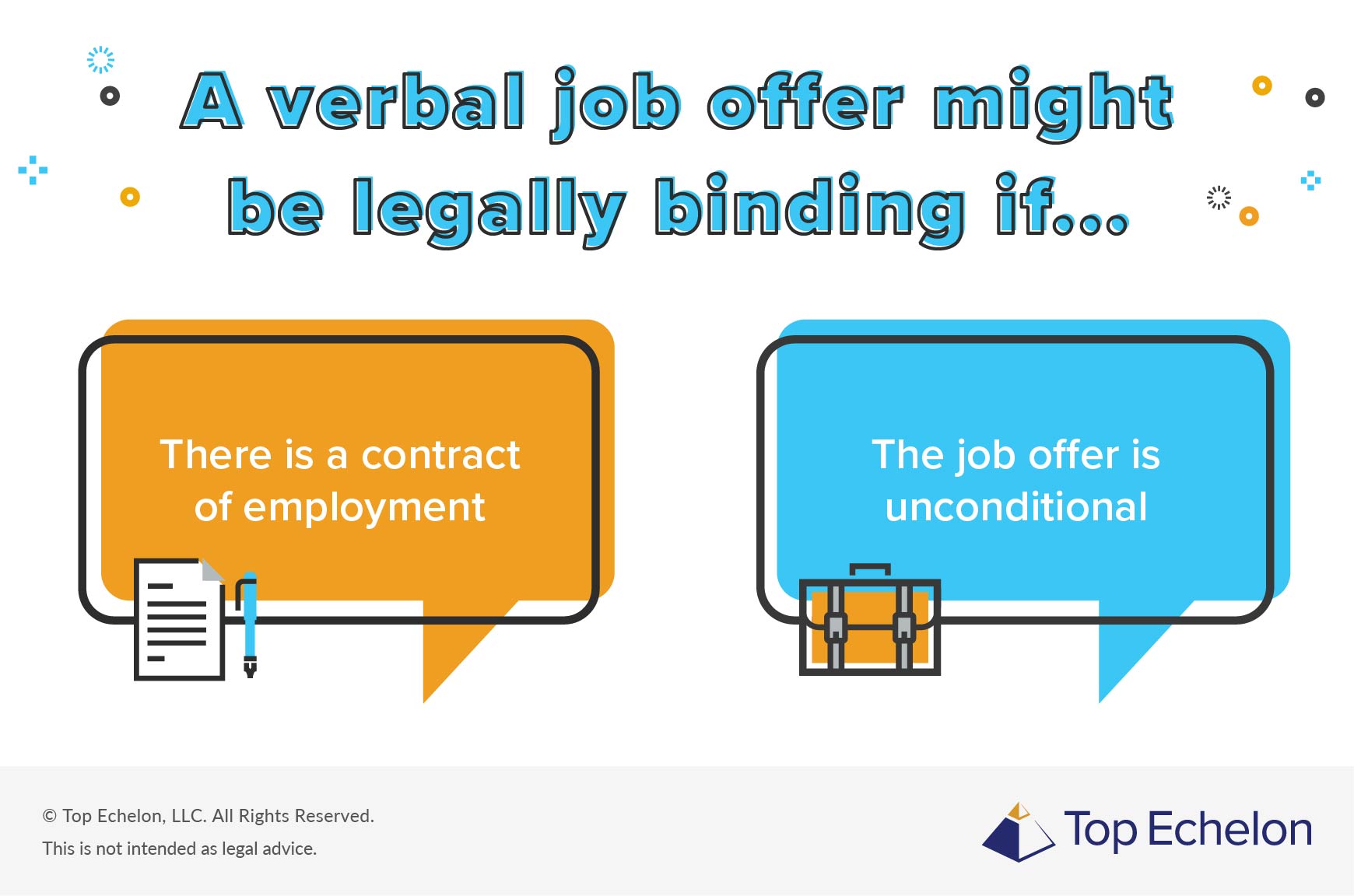“On behalf of my client, I would like to offer you the position. Please keep an eye out for a forthcoming formal job offer letter.” Sound familiar? Extending a verbal job offer is commonplace for many recruiters and other hiring authorities. But, could a verbal job offer put you in a legal bind if your client decides to rescind offer of employment?
Taking back a verbal job offer a candidate has accepted is uncomfortable for everyone involved. And, as a recruiter, being able to answer Is a verbal job offer binding? is crucial to the integrity of your career.
You don’t want to open your recruiting business or your client’s company up to a lawsuit. Understand the power of the verbal offer of employment before making the call to your candidate.
What is a verbal job offer?
A verbal job offer is an offer of employment typically made before sending the candidate a written job offer. Verbal job offers may also take place, contingently, before the hiring authority conducts a reference check for employment, background check, and drug test.
The verbal job offer is a chance for you and the candidate to negotiate details about the position, including salary, benefits, and start date. The candidate may ask questions and share concerns about the offer.
Generally, recruiters and other hiring authorities extend the job offer to the candidate over the phone. You might request that the candidate either accept or decline the position within a certain time period (e.g., 48 hours).
Verbal job offer follow-up
The verbal job offer follow-up includes either a contract of employment or an at-will employment doctrine. Both the contract of employment and at-will employment doctrine are written job offers that provide more information about the position and company.
A contract of employment is a document that binds an employee to a company for a set period of time, whereas an at-will doctrine states that an employee’s position can be terminated at any time. The document you and your client use determines whether a verbal job offer is binding.
Verbal job offer: Legally binding?
So, is a verbal job offer binding? The answer depends on a number of factors.
Before diving into those factors, be aware that a verbal job offer holds, in theory, the same weight as a written job offer—however, verbal job offers are more difficult to enforce. If a written job is legally binding, the accompanying verbal job offer likely is, too.
Verbal job offers are binding if:
- There is a contract of employment
- The job offer is unconditional
Additionally, your client cannot rescind a verbal job offer if their reason is discriminatory against the candidate’s race, color, religion, sex, age, national origin, disability, or genetic information.
Contract of employment vs. at-will employment
Aside from Montana, U.S. states have employment-at-will laws, meaning the employer can terminate the employee at any time and for any reason, if the employee hasn’t started working at their business.
Employees are considered at will unless the employer issues a contract of employment.
An employment contract is a legally binding document that defines how long the employee is contracted at the business, as well as the employee’s compensation, responsibilities, and other job-related information. Employment contracts typically also include specific actions that would dissolve the contract.
If you extend a verbal job offer to a candidate and use contractual language (e.g., “My client’s company won’t terminate you if you agree to a two-year contract”), you may create an implied or oral employment contract. In this case, the verbal job offer is binding, as long as it is unconditional.
Conditional vs. unconditional verbal offer of employment
Verbal job offers may also be binding if they are unconditional. An unconditional job offer means that the candidate has either already met certain requirements (e.g., reference check) or is not required to.
Many verbal job offers are conditional, meaning they are contingent on whether the candidate meets specific requirements, such as passing a drug test, background check, and reference check.
If your job offer is contingent on the candidate meeting a job requirement, and the candidate does not meet that requirement, the verbal job offer is not legally binding. Your client can take back the employment offer.

